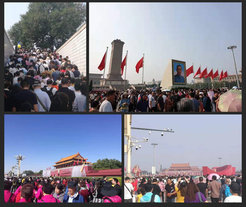Blog | October 2019
70th anniversary - Patriotism becomes fashionable in China
by Jie Kang, 13 October 2019, in Beijing
The ceremony of the 70th anniversary of the founding the PRC started on 1st of October at 10 am. At 9:45 am, I was walking along a street near the Beijing national stadium, the ‘Bird’s Nest’, to the service center of the China Mobile Company. I noticed that the normally crowded streets were almost empty and unusually quiet. This was not however a result of it just being a national holiday. For it was only after the closure of the celebration ceremony that the streets returned to normal noise and crowds. The streets had been empty because evidently most people were watching the ceremony. The service center which I entered had no customers and the sales assistants were gathered around TV sets, waiting for the ceremony. A sales person serving me was quite impatient, as she herself wanted to watch the ceremony rather than work to quickly conclude our business in time for the start of the ceremony. Other sales staff joined us and stood before the small television. Everyone was holding a little national flag that had been handed out by a member of staff. At exactly 10 am, following an announcement by PRC Premier Li Keqiang, the ceremony was opened by a 56 gun salute firing 70 rounds, representing China’s 56 ethnic minorities and 70 years of effort and achievement. The entire picture was of grandeur expressed with great solemnity and respect. A girl next to me said “I am so excited that I have goose bumps. ” While the gun was still sounding, a parade of the guard of honor of the Chinese Liberation Army with the national flag marched in step towards the platform where the national flag was raised. The national anthem was played as it was raised and everyone stood reverently. I observed that many people around me were very moved to the point of tears. After the ceremony, a friend told me how excited and proud of China she felt on this day, watching the military parade. This was a prevalent emotion and reflects what has in fact been the evident growth in current China of expressions of national pride and confidence.

In the service hall of the China Mobile Company, staff are holding a national flag and watching the ceremony of the celebration.
I also noted during my stay in China that the patriotic song “My people, My Country ” has become extremely popular, and further reflected this new confidence:
My motherland and I cannot be separated for a second.
Wherever I go, I have a song for you.
You tell me stories by the pulse of a mother’s heart.
My motherland and me like the sea and her spray.
The sprays are the children of the sea, the sea is the supporter of the sprays.
Whenever the sea smiles, I am the whirlpool of laughter.
I share the sorrow of the sea, I share the joy of the sea.
Another friend said that he could not help but sing this song all the time, which has almost become an earworm. The song is one of the so-called “red songs” composed in 1985 by Zhang Li and has never been this popular over the last 30 years or more. So why have Chinese young people suddenly started singing an old propaganda anthem? Why, all of a sudden, has patriotism become fashionable? It is not enough to claim that it is because the Chinese government has successfully brain washed the Chinese people through heavy surveillance and strict control of dissent. The situation is more complicated than that and involves a more subtle kind of influence. Just as the song describes the sentiment that many Chinese now have for their ‘motherland’, so China has become deeply and emotionally identified by many Chinese as akin to one’s own mother. She is depicted as the old mother who suffered and struggled over the last 70 years but has finally emerged as strong and prosperous. A complicated mixture of pain and pride is how many Chinese express their feelings for their homeland. An idiom conveyed here, which Westerners might find difficult to understand, is expressed in the idea of an unchanging Chinese mother-child relationship rooted in common blood. Thus, however wrongly a mother might treat her children, their love for her is unalterable. A Chinese university professor once told me “Mother is like a God at the heart of all Chinese men.” The lyricist Zhang Li who wrote the song “My people, My Country” suffered greatly for 20 years, including during the Cultural Revolution. When a journalist asked him how he could still write the lyric with such deep feeling for his homeland despite his many years of suffering, he said “how could a child hate his/her own mother, even if she unjustly beat him/her.”

Moreover, the recently released film “My people, my country” brought in nearly 2.56 billion yuan in the first 14 days at the box office and is among the top ten Chinese films. The film consists of seven independent dramas directed by seven directors played by many of China’s premier actors. Different from previous propaganda films such as “The founding of a republic”, “My people, my country” follows selected historical events in China around small characters who are flawed human beings, but who, through identification, trigger a more approachable, affable and heart-rending experience of patriotism. I am told by young people that they have shed tears several times while watching the film. By downplaying the political situation and accompanying propaganda, both the film and the song adopt a personally intimate style in expressing deep love for one’s country, so creating a close relationship between the country and its people. It is like a big abstract image of the homeland suddenly stepping down from the stage and becoming an approachable human being with whom one can easily communicate. In WeChat or other social media, many people post messages such as “My dear motherland, happy birthday!” or “I love you my motherland”. The Chinese communist party has thus become more sophisticated in instilling patriotism, which young Chinese people unconsciously subscribe to through this passionate and enthusiastic love for their motherland. Indeed, this is observable throughout much of China where, despite somewhat hidden ethnic and religious conflicts, an atmosphere of excitement and joyfulness accompanies the rise in national confidence and pride.

Insider and outsider
Alongside the overall optimistic patriotism, a sharper social boundary has developed between Chinese citizens and foreigners in China; this is especially evident in use and access to the internet. Once you enter the country, most of the usual Apps, such as Google, YouTube, Facebook, eBay, Gmail, Google map, are completely blocked. There is no alternative but to download Chinese Apps such as Baidu, Taobao, 163, WeChat, Amap. These are not at all slower and less functional. On the contrary, Chinese Apps are now incredibly advanced. For instance, the WeChat App supports all kinds of payments, including your daily expenses, restaurants, shops, supermarkets, all living payment, taxi drivers, street vendors and even street beggars, who happily accept money through WeChat scanning. The App Didi provides a taxi and express car calling service, through which, anywhere in Beijing, the caller gets a vehicle within a minute alongside accurate information about it, such as its registration number, color, model, distance from your location and time of arrival, together with the driver’s cell-phone number. Almost all kinds of transactions can be done through cell-phone scanning system, obviating the need for cash or credit cards, making life convenient and comfortable for Chinese consumers, as they see it.
However, for foreigners the experience may nowadays be the opposite. The whole system is designed for the Chinese by the Chinese. In order to enter the system, you have to purchase a sim-card at one of the Chinese telecom companies and open a Chinese bank account. In order to do so, a Chinese ID card is certainly needed. For both buying sim-card and opening a bank account, biometric data will be collected including face and fingerprint verification. For a long time, the Chinese sim-card has been using a real-name system. However, unless obtaining a work visa, foreigners are not able to open a bank account at a Chinese bank, which means all of the services that are provided for Chinese ‘insiders’ through the cell-phone system, are closed to foreigners and life is thus made inconvenient and more complicated. Foreigners who used to enjoy privileges now become marginalized by the rapidly digitalized Chinese life style. While applying for a Chinese visa for my daughter, I observed the increasingly complicated process compared with a few years ago when much fewer documents were required. It seems to display a signal – that being Chinese has now become more privileged. This national boundary-marking has apparently become another reason that Chinese young people are proud of China: it is a reversal of past practices that privileged (mainly Western) foreigners over the indigenous Chinese.
Moreover, the boundary of insider and outsider applies not only to foreigners, but also to Chinese people that are defined as outsiders. Only a few days before my departure from Beijing, my cell-phone number was suddenly suspended. I was told by the Mobile phone supplier company that my phone was blocked by the Bureau police of the Anti-fraud office in Beijing. Before this happened, life was all fine and convenient. All of a sudden, I became a total outsider of the system and felt rather helpless and powerless. It shows how easy the state is able to cut off your life by simply suspending a cell-phone or an ID-card without even giving a legitimate reason. I had to struggle with all kinds of thoughts as to what I had done during the preceding few hours, and whether or not I had said something sensitive to arouse suspicion. I felt small and scared, confronted by the invisible yet powerful and threatening giant of statecraft. Following online instruction, I did upload the required documents such as my ID card number, my name including a photo with me holding my ID card and the newspaper of the day. After three days, the suspension of my phone was lifted without any reason given as to why it was suspended in the first place.
Beyond doubt, the Chinese government has become even more centralized and authoritarian. However, it is not through obvious, physical, cruel or brutal violence. Rather, it has become quite unconscious, by providing a more comfortable and convenient life for people who are happily willing to cooperate with the state and supply it with all of the requested information. When I talked to people about their opinion on state surveillance via the countless video cameras everywhere, they are all surprisingly positive and believe that the society is better protected and criminals will be found more quickly and easily. “If you are a good person, you don’t have anything to hide. ” “We Chinese don’t’ need privacy.” This reflects the impression that for many Chinese, this is just like a mother being responsible and protecting her children. The belief is that she, as the personification of the motherland, is protecting them by implementing all possible measures including a technologically sophisticated system of surveillance and, at the same time, satisfying their consumer tastes.














